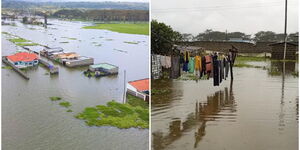The Ministry of Health has designated Terminal 1A, Gate 16 at the Jomo Kenyatta International Airport (JKIA) as the select entry point for travelers from Uganda and Tanzania, where Marburg, Mpox and Ebola cases have been on the rise.
This is among a raft of measures the Ministry is taking to enhance the country's preparedness and prevention against the Marburg, Mpox and Ebola crisis that have been reported in the neighboring countries.
The directive was made by the Health PS Mary Muthoni, who was visiting JKIA alongside World Health Organisation (WHO) Country Representative Dr Abdourahmane Diallo and International Organisation for Migration (IOM) Chief Migration Officer Basnet Mukunda to engage the Border Management Committee on strengthening disease surveillance and response.
“Kenya remains committed to protecting public health through proactive surveillance and emergency preparedness. By working closely with global partners, we are strengthening our capacity to detect and respond to disease threats at our borders,” PS Muthoni said during the visit.
According to the PS, the designated entry points for travelers from these two countries are important since Kenya is already grappling with the MPox disease while the region is tussling with Marburg and Ebola threats.
Further, the Ministry is formulating a multi-agency strategy to operationalize the Kenya Emergency Preparedness and Response Plan across all points of entry in the airport.
The Ministry is reinforcing border screening, rapid response mechanisms, and public awareness which they have described as essential to preventing disease importation and safeguarding public health.
Travelers from affected regions are required to complete health declaration forms, while strict hand hygiene protocols, including handwashing and sanitization, are enforced.
Further, debarkation procedures for travelers from Tanzania will follow stringent public health guidelines to ensure safety.
The move comes even as cases of Mpox in the country increased to 41 with viral hemorrhagic fevers spreading across East Africa.
Three new Mpox cases were confirmed in Busia County, raising the number of confirmed infections in Kenya to 41 since the outbreak began.
So far, the disease has spread across 12 counties, with cases reported in Nakuru (10), Mombasa (8), Busia (7), Nairobi (2), Kajiado (2), Bungoma (2), Taita Taveta (2), Kericho (2), Makueni (2), Kilifi (2), Kiambu (1), and Uasin Gishu (1).
“So far, 419 samples from suspected cases have been tested at the National Public Health Laboratory and partner labs, with 41 returning positive results, 376 testing negative, and two still undergoing analysis,” the PS said in a statement.












